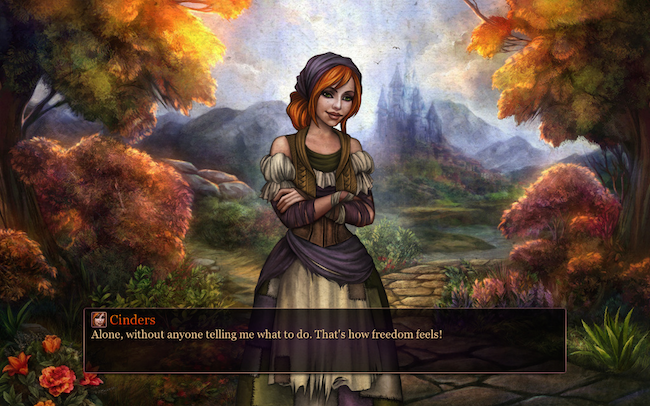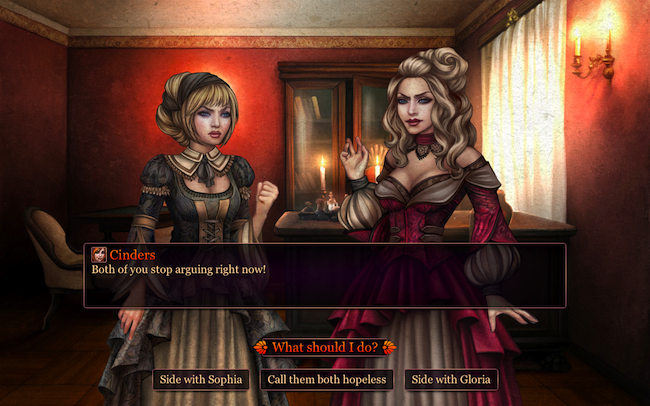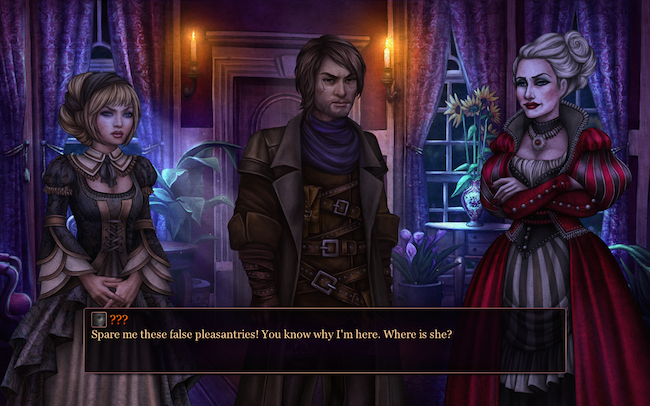
There has been a lot of debate this past year about what exactly constitutes a “game.” Is “The Walking Dead” still a game because there is no direct player control other than walking? Is “Gone Home” still a game because the experience is entirely exploration-based; without action? In my opinion, yes, they are. However, in saying that, what does it even matter if these experiences transcend traditional entertainment mediums to provide engaging experiences? By definition, a game is something we engage in for the purpose of amusement. There are no specifics of winning or losing, gameplay mechanics, or mention of any type of formula. Its purpose is to engage.
This got me thinking: what would a narrative-based experience such as The Walking Dead, which is filled with lots of meaningful decisions, be like if you took away the “point-and-click” investigative elements, and instead, focused entirely on interactive dialogue and consequences? Would it still feel like a game, and would it still have the same impact on the player? Up until now, I have never taken an interest in visual novels as I didn’t really get what they were about, and as such, I didn’t bother to look into it any further. However, earlier this month, my curiosity brought me to a particular title called “Cinders,” which caught my attention in Steam with its incredible artwork.

In essence, Cinders is a mature reimagining of Cinderella, with a heavy emphasis based on player decision. The protagonist, Ciders, is a young woman living oppressively in a household with her step-mother and two step-sisters; having found herself in this situation after the passing of her father. This is the premise we’re all familiar with, and in turn, further conventional elements are conveyed, such as the “The Ball” “The Fairy God Mother,” and “The Prince.” However, beyond a core framework, Cinders is an entirely original take on the story, which is further developed with the ability to make meaningful decisions. It’s completely independent and guaranteed to surprise.
Cinders, herself, is a wonderfully written character, and while the player does influence her personality, she is not nearly as subjective and benign as her original counterpart. This is a story of many complex relationships, where the focus is about exploring what makes a person the way they are. In the original tale, I don’t remember having any sympathy for her genuinely rotten step-family. However, in Cinders, you have the ability to connect with each character, and in truth, while I didn’t often always agree with the actions of said characters, I found myself feeling somewhat understanding of their situation. This was a powerful revelation that often influenced my decisions.

Understandably, I went in with pre-conceptions based on the source, and quickly, I found myself feeling guilty for some of my responses to the step-sisters in particular. These were not the two-dimensional trolls I thought I understood, and for me personally, I even came to befriend one of the sisters as I genuinely empathised with her. Having played through several times for the purpose of the review, I can tell you that your dialogue options are very impactful. You absolutely have the ability to isolate yourself from every person you meet if you don’t think clearly about what you say, and the direction of the narrative will change accordingly. In fact, to the extent that the story could potentially conclude with Cinders having never found love, totally isolated, and destined to die alone.
The beautiful thing about the decision making in Cinders is that there is so much moral grey area, and it’s very easy to be manipulated by circumstance and the characters. At times, you might feel guilty for having assumed the worst of someone, only to lower your guard and have it all thrown back in your face. It was impressive how the writers could somehow impose guilt on me for my emotions, when in reality, I knew I was justified in feeling hard done by. However, in other instances where I did choose to take aggressive action, I that learned I could indirectly hurt other people, which further complicated my choices. In real life, people are often irrational and unpredictable, and such is the case here. There was no clearly defined “paragon” or “renegade” pathways, just decisions to be made and consequences for your actions. This is not an “illusion of choice.” Every word mattered.

For those of you who have never engaged a visual novel before, essentially, it is like reading an intricate choose your own adventure book. The difference here being that there are backdrops with minor animations, as well as music and sound effects to set the tone of the scene. It might just sound like a more convenient way to read a book, but there is something really special about the whole experience, and it does engage the reader differently to that of a conventional novel. Basically, the readers imagination is engaged to work in conjunction to fill the gaps between what’s happening in the story and what you’re seeing and hearing. When you read a book, there is a degree of recollection to the events as if they actually happened to you personally, but with a visual novel, those recollections are that much more defined. It’s really something you need to experience in order to understand.
As you would likely expect, the visual aspect of a visual novel is likely the most important element of the experience; which is somewhat true. The artwork in Cinders is genuinely breathtaking in comparison to a lot of the manga-inspired works out there. The attention to detail is superb, and it’s clear that a lot of thought went into choosing what elements of the artwork would be animated, and what sound effects would be included. The balance between the two is near-perfect, and as such, it’s very easy for players to step through what I call, “the magic circle”, where they can become fully engaged in the fantasy. In addition, much like The Walking Dead, there in a visual indicator in the top right-hand corner that alerts the player when the story has deviated based on a previous decision. This works especially well to reinforce that you’re consistently influencing world around you.
Cinders is all about learning to understand the motivations of people, no matter how awful they might appear on the surface. As such, the novel is filled with many grey decisions that are hard to predict, and that is a large part of its success. Every line of dialogue matters, and I was surprised with just how different my relationships could be based on seemingly small choices. After several playthroughs, I am yet to achieve what I would consider the “golden ending,” and I am more than okay with that. Most games only present the “illusion of choice”; with Mass Effect being one of the most infamous examples. This is not the case here, and while it’s certainly a different experience to a conventional game, it stands independent as a beautiful and uniquely engaging experience. The writing isn’t perfect, but Cinders is still an outstanding example of the nuances of decision making, as well as the consequences that follow. I believe that it deserves to be experienced by anyone who enjoys reading or games.











